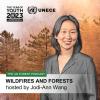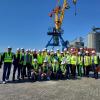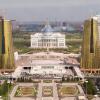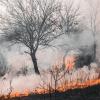News
Displaying Results 1 - 25 of 35
In recent years, the participating States of the United Nations Special Programme for the Economies of Central Asia (SPECA) - Afghanistan, Azerbaijan, Kazakhstan, Kyrgyzstan, Tajikistan, Turkmenistan, and Uzbekistan - have observed rapid growth in the number and impact of business incubators and…
With a long history of reliance on resource-based industries for growth, countries of the United Nations Special Programme for the Economies of Central Asia (SPECA) - Afghanistan, Azerbaijan, Kazakhstan, Kyrgyzstan, Tajikistan, Turkmenistan, and Uzbekistan - have embraced the power of innovation…
Forest ecosystems in the Caucasus, Central Asia and Eastern Europe are struggling with the complexity of changing climatic conditions, human and natural pressures threatening their vitality and resilience.
To address these challenges and promote sustainable forest management, data on forest…
Every year, forest fires set new records. The 2023 wildfire season in the Northern Hemisphere could not have been worse.
The wildfire that ravaged northeastern Greece in August was the largest single wildfire recorded in the European Union (EU), burning more than 810 square kilometres.
In the…
Many incidents in freight transport are attributed to poor practices in the packing of freight containers, including inadequate securing of cargo, overloading and incorrect declaration of contents. The victims of these incidents may be the general public or transport and supply chain workers, who…
The building industry currently accounts for 39% of global energy-related CO2 emissions, 11% of which result from manufacturing building materials and products such as steel, cement, and glass. And yet, to date, emission reduction efforts have not really focused on decarbonizing the construction…
While many of us have taken pain relievers, we do not always remember that one of the most extensively used medicines in the world – with an estimated annual consumption of 40,000 tons – salicylic acid, commonly known as aspirin, is based on a tree-derived ingredient.
The theme of this year’s…
In the past years, Central Asia has been facing major climate-change related challenges – drought, floods, desertification, sandstorms, extreme cold and heat spells – and many more. Not only have these affected rural areas, but cities have been suffering, too. Accentuated by increased traffic…
During her recent two-day visit to Turkmenistan UNECE Executive Secretary Olga Algayerova spoke at international conference “Dialogue is a Guarantee of Peace” in Ashgabat and discussed areas of cooperation with the highest government officials, focusing on future circular, digital and green…
During its recent mission in Turkmenistan, a UNECE delegation presented a proposal for a new analytical project - “Trade and Innovation for Sustainable Development of Turkmenistan” - to the government and international stakeholders, aimed at supporting the country to enhance innovation governance…
UNECE and the QazTrade Center for Trade Policy Development are joining forces to advance sustainable trade and the circular economy in Kazakhstan. Kazakhstan is the first country in Central Asia to use the SPECA Principles of Sustainable Trade - a set of twenty principles, adopted by the countries…
The buildings and construction sector accounted for 36% of final energy use and 39% of energy and process-related carbon dioxide (CO2) emissions in 2018. According to the Intergovernmental Panel on Climate Change, building materials including steel, cement and glass emitted over 2.2 Gigatonnes of…
Climate change is progressing faster than trees can adapt. Challenges and uncertainties to the state of the world’s forests and their future are growing.
This summer, Europe saw record-breaking temperatures and a series of heatwaves that intensified drought conditions. With more than 760…
SPECA countries are facing unique challenges, stemming from at least three crises: the need to deal with the regional and global repercussions of the COVID-19 pandemic, the political upheaval in Afghanistan, and the conflict in Ukraine. With the correct policies and mechanisms for subregional…
The Covid-19 pandemic continues to hit hard the countries of the United Nations Special Programme for the Economies of Central Asia (SPECA) and highlights the need to diversify from current, resource-dependent models of economic development. This will mean putting ‘innovation and technology that…
Four years ago, the countries in the Caucasus and Central Asian region pledged to restore more than 3 million hectares of degraded forests by 2030 under the global Bonn Challenge. To support them in turning their pledges into reality, the United Nations Economic Commission for Europe (UNECE) and…
Countries in the UN Special Programme for the Economies of Central Asia (SPECA) are falling behind potential on many metrics of innovation performance. R&D spending remains below 1 per cent of GDP, almost entirely publicly funded, and SPECA countries rely extensively on natural resources,…
Single-use cutlery pollutes our oceans and takes thousands of years to decompose in landfills and trash heaps. Plastic forks and knives may photo-degrade with exposure to the sun, but they become microplastics that continue to pollute our environment. In addition to reducing our overall material…
UNECE was engaged at the main global forum to assess and discuss progress in implementing the Sendai Framework for Disaster Risk Reduction (DRR) – the seventh session of the Global Platform for Disaster Risk Reduction (GP2022) held in Bali and online, 25-27 May 2022, fully embracing its theme: “…
Cities, which are already responsible for around 75% of global CO2 emissions, are also at the forefront of fighting climate change and simultaneously are particularly vulnerable to its impacts. Urban trees and forests have been highlighted as a solution that can help to achieve the SDGs and make…
Fashion and packaging have one thing in common: both rely heavily on plastics. Oil and gas companies look to plastics as a key area of growth. Global plastic production doubled since 2000, to reach an astonishing 460 million metric tonnes – per year. This means that more plastics have been produced…
Tackling climate change and plastic pollution requires decisive measures at all levels, from international policy coordination to innovation in industry and changes to unsustainable practices in our everyday lives. As one example, the rise of online shopping and food delivery services allows us to…
The Caucasus and Central Asia accounts for over 30 million hectares of forests and wooded lands, an area approximately the size of Italy Forest landscape restoration in this area is critical for supporting livelihoods and local economies, preventing soil erosion and desertification, enhancing…
COP26 was a positive step forward in the fight against climate change, but as the UN Secretary General pointed out in his comments: “it is not enough. We must accelerate climate action to keep alive the goal of limiting the global temperature rise to 1.5 degrees.” The compromise deal reflects the…
A coordinated, evidenced-based policy framework is critical for governments and stakeholders to tackle the complex challenges that face the forest sector in Europe and beyond. With transparent data, objective analysis and holistic policy recommendations, the sector will have increased capacity to …


























